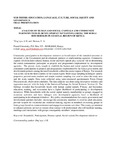| dc.description.abstract | Community participation in development initiatives as beneficiaries of the intended outcomes is important to the Government and development partners as implementing agencies. Community capitals which include cultural, human, social and built capitals play a crucial role in determining the extent communities participate in projects and programmes implemented by development agencies. The present study sought to establish the human and social capitals that determine community participation in projects and programmes implemented by the Kenya government and development partners among the rural households within the coastal region of Kenya. The research was carried out in the three counties of the coastal region. Multi-stage sampling techniques namely purposive, proportionate random and simple random sampling was used to select the study area and the study sample. Data were collected using semi-structured questionnaire Focus Group Discussion and observation schedules. The data analysis was done using descriptive statistics and regression analysis with the help of the Statistical Package for Social Sciences Version 22. The findings revealed that households heads with human capital namely Primary and Secondary education, training, and occupation have a higher likelihood of participating in development initiatives. While households with the social capital namely membership to groups engaged in economic activities and have linkages with development agencies, have a likelihood of participating in development initiatives. Key policy recommendations for county government and development partners includes: encourage the community members to enroll in adult education, provide support for vocational and technical training, register as members in existing groups or form groups based on common interest and engage in economic activities. The county government to enhance advisory services to ensure close contact with professional who will facilitate training, meetings and interactions with groups consequently members’ empowerment. | en_US |

